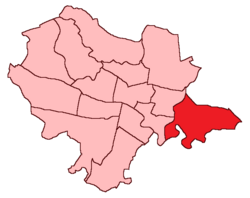Boundaries
1918–1950: "That portion of the city which is bounded by a line commencing at a point on the municipal boundary about 299 yards north-westward from the centre of Carntyne Road, at a point where the municipal boundary intersects that road, thence eastward, south-eastward and westward along the municipal boundary to the centre of the Caledonian Railway Branch Line from Rutherglen to Dalmarnock, thence northward along the centre line of the said railway until it, joins the Caledonian Railway (Glasgow Lines), thence northward, north-eastward, northward and north-eastward along the centre line of the last-mentioned railway to a point 380 yards south of the centre line of Cumbernauld Road, thence south-eastward to the point of commencement."
1950–1955: The County of the City of Glasgow wards of Parkhead, Shettleston, and Tollcross, and part of Mile-End ward. [1]
1955–1974: The County of the City of Glasgow wards of Parkhead, Shettleston, and Tollcross, and part of Mile End ward. [2]
1974–1983: The County of the City of Glasgow wards of Mile-End, Parkhead, and part of the Shettleston and Tollcross ward. [3]
1983–1997: The City of Glasgow District electoral divisions of Belvidere/Carntyne, Mount/Baillieston, and Parkhead/Shettleston.
1997–2005: The City of Glasgow District electoral divisions of Calton/Dalmarnock, Gorbals/Govanhill, and Shettleston/Tollcross.
This page is based on this
Wikipedia article Text is available under the
CC BY-SA 4.0 license; additional terms may apply.
Images, videos and audio are available under their respective licenses.
